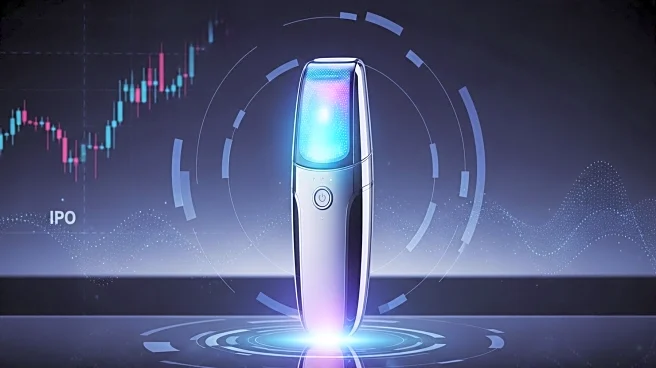What is the story about?
What's Happening?
The Beauty Tech Group, a prominent player in the at-home beauty device market, has launched its initial public offering (IPO) on the London Stock Exchange. The IPO was priced at 271 pence per share, giving the company an expected market value of £300 million under the ticker 'TBTG'. Founded in 2009 by Laurence Newman, the company has grown significantly, known for its brands such as CurrentBody, ZIIP Beauty, and Tria Laser. The initial offering includes over 10.7 million shares, equating to a total offer size of £106.5 million, representing approximately 35.5% of the company's issued share capital. Within half an hour of the launch, the share price increased by over 4%.
Why It's Important?
The IPO of The Beauty Tech Group is a significant milestone for the company, marking its transition from a startup to a publicly traded business. This move highlights the growing importance and market potential of at-home beauty devices, a sector that has seen increased consumer interest. The successful launch on the London Stock Exchange could pave the way for more beauty tech companies to consider public offerings, potentially leading to increased investment and innovation in the industry. The Beauty Tech Group's IPO also reflects the broader trend of tech-driven beauty solutions gaining traction in the market.
What's Next?
Following the IPO, The Beauty Tech Group is likely to focus on expanding its market presence and enhancing its product offerings. The influx of capital from the public offering could be used to invest in research and development, marketing, and possibly international expansion. Stakeholders, including investors and industry analysts, will be watching closely to see how the company leverages its new public status to drive growth and profitability. The success of this IPO may also influence other beauty tech companies to explore similar opportunities, potentially reshaping the competitive landscape.
Beyond the Headlines
The IPO of The Beauty Tech Group may have broader implications for the beauty industry, particularly in terms of how technology is integrated into consumer products. As more companies explore tech-driven solutions, there could be ethical considerations regarding data privacy and the use of technology in personal care. Additionally, the success of such companies could lead to shifts in consumer behavior, with more individuals opting for at-home beauty solutions over traditional salon services.

















